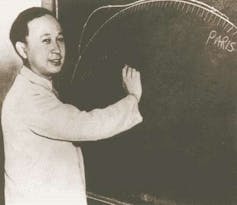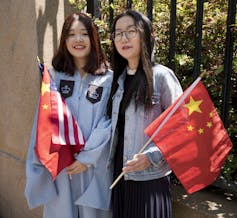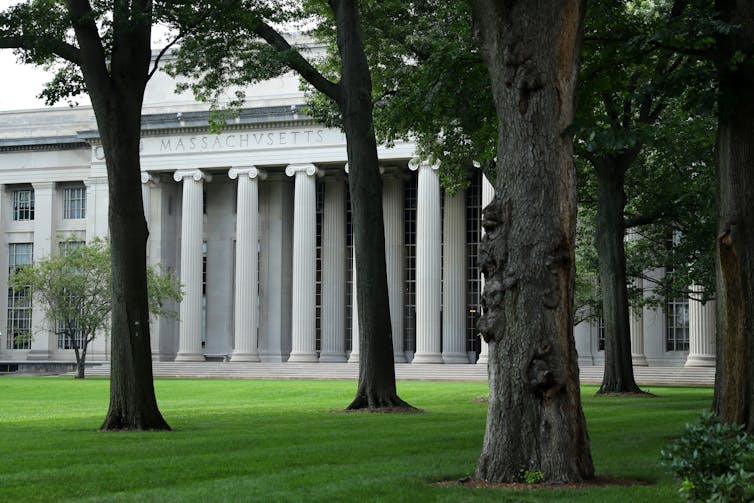Caroline Wagner responds to the arrest of MIT engineering professor Gang Chen earlier this month.

(7postman/E+ via Getty Images)
By Caroline Wagner
The Ohio State University
 The arrest of MIT engineering professor Gang Chen on Jan. 14 has drawn attention to the role of China in U.S. science and technology system. It’s not the first time suspicions have fallen on a Chinese-born scientist – Chen is a naturalized U.S. citizen – for work they conduct openly in the United States.
The arrest of MIT engineering professor Gang Chen on Jan. 14 has drawn attention to the role of China in U.S. science and technology system. It’s not the first time suspicions have fallen on a Chinese-born scientist – Chen is a naturalized U.S. citizen – for work they conduct openly in the United States.
The charges against Gang Chen – wire fraud, failing to report a foreign bank account and a false statement on a tax return – stem from failing to disclose Chinese funding for his research. MIT called the allegations “distressing,” and the school’s president and 100 faculty members are defending a Chinese university’s investment in MIT research. No evidence of spying has been made public, but a Department of Justice criminal complaint expressed suspicions that Chen’s loyalty may not be aligned with American interests.
These kinds of investigations risk damaging one of the U.S.‘s most important assets: open inquiry.
The U.S. government’s scrutiny of Chinese Americans and Chinese scholars runs up against the value of open scientific exchange. My research on international collaboration in science has shown that open nations have strong science. Nations that accept visitors and send researchers abroad, those that engage richly in cross-border collaborations and fund international projects produce better science and excel in innovation. Closing doors inhibits the very trait that makes the U.S. innovation system the envy of the world.
For six decades, the United States has been the mecca for smart people interested in conducting research. But this changed under the Trump administration: Government agencies looked with extra scrutiny at scholars from China for fear they planned to steal intellectual property. In a speech to U.S. academics, an FBI official has stated, “…the greatest long-term threat to our nation’s information and ideas and to our economic vitality and leadership is the threat from the Chinese government.”
Scrutinizing Chinese researchers as if their actions automatically deserve suspicion threatens to poison the relationship between the U.S. and China, the rising world power in science and technology. I contend that cutting off this relationship makes the American innovation system more vulnerable, not safer. U.S. strength is in rapid innovation in an open environment; China’s choice for a more closed society may work against their innovation goals, but we should not turn it against our own.
Different Countries, different treatment
The tales of two rocket scientists reflect what I consider the danger inherent in fears of Chinese influence.

(Shizhao/Wikimedia Commons)
Qian Xuesen, a Chinese-born scientist educated at MIT, helped the United States win World War II with contributions to jet propulsion research. After the war, Qian worked at Caltech publishing brilliant science.
Sadly for him, the early days of American rocket science coincided with growing suspicions about foreign influence in the United States, similar to concerns seen now. Qian’s coworkers began to worry whether he was American enough in his allegiances.
At the same time that suspicions gathered around Qian and others, the American government’s secret Operation Paperclip brought Wernher von Braun and other Nazi military rocket scientists to the United States. Von Braun and others spent a decade under military custody, accelerating the American rocket program.
Both Qian and von Braun spent the early 1950s under house arrest, but for different reasons and with different ends. Although no evidence was ever presented, in 1955, Qian was deemed a spy and deported. China welcomed him back, building him a laboratory; he is called “the father of Chinese space technology.” Encouraging Qian to remain in the U.S. likely would have delayed Chinese advances in missile technology.

(NASA, CC BY)
In contrast, von Braun led U.S. rocket science to success in the Cold War’s space race. He went on to great acclaim in the United States and became an American citizen, working for NASA for the rest of his life.
American suspicions about China have a long history, fed by xenophobia and anti-Communist views. Even now, U.S. law prohibits NASA from cooperating with China. As China has grown to be the world’s largest high-tech exporter, fears and anger grow that China is stealing U.S. know-how. China’s case is complicated by its sheer size as well as internal links between science and military technology.
Chinese Scholars in the US
Even in the face of political tensions and visa challenges, the number of international Chinese students and scholars moving to the U.S. for higher education and to participate in research and development grew spectacularly in the decade leading up to the Covid-19 pandemic.

(AP Photo/Mark Lennihan)
Chinese students studying in the United States in 2017 numbered about 141,000 undergraduates and 125,000 graduate students. An estimated 4,400 Chinese scholars (which can include students) came to the U.S. in 2017 to work in American labs, joining more than 9,000 already in the U.S. Chinese doctorate earners graduating from American universities in 2018 with plans to remain in the U.S. numbered more than 4,000 – similar to the preceding five years.
What Happens When Scientists Migrate
The “mosaic theory” has been borrowed from finance to apply to Chinese students, visitors and emigres in the United States. U.S. government officials fear that each visitor could each be contributing a single “tile” of knowledge that, once recombined in China, construct complicated mosaic patterns of deep scientific and technological insights and capacities.
This idea assumes that China possesses a great deal of core knowledge needed to reassemble the information. It would also rely on a herculean feat of organization.
Moreover, the mosaic theory misunderstands science and technology, which is quite unlike finance where a dollar can be in only one place at a time. Scientific research is shared and multiplied through open exchange, communication and mobility. Knowledge held in secret gets old and stale very quickly. Researchers who do not share are shunned: It is exchange and recombination that creates the value.

(Maddie Meyer/Getty Images News via Getty Images)
The United States has benefited mightily from the openness of its system to welcome smart people from anywhere in the world to help build a knowledge base. One-third of Nobel Prizes awarded to U.S.-based scientists have gone to immigrants. People who spend time in the U.S. and later return home often continue to link to their American counterparts, creating a global network of connections with broad global (and national) benefits.
Covid-19 research and development experiences highlight the benefits of openness. In the earliest days of the pandemic, Chinese researchers galvanized world research by publishing the genome sequence of the novel coronavirus. International coronavirus researchers who had formed connections over the decade prior to Covid-19’s emergence were energized into action. Rapidly, Chinese and U.S. scientists increased their cooperation on virology, immunology and epidemiology to lay the groundwork for rapid testing, treatment and vaccines. Regrettably, political actions on both sides cooled the early actions and reduced the linkages, but vaccines were on the way.
The United States can continue to discourage Chinese researchers from participating in its research, stuck in binary mode of viewing relations as so-called “great power competition.” China is not an ally, so it does make sense to me to restrict cooperation on military technologies.
But suspicions about Chinese researchers — ones echoing a Red Scare and fears of spying — will send home the next Qian Xuesen to build China’s capabilities. I suggest the U.S. would benefit from recognizing the critical role of open research, the enriched scientific capacities of many countries and the benefits the United States receives thanks to knowledge created or reintegrated here by immigrants and visitors.![]()
Caroline Wagner is Milton & Roslyn Wolf chair in international affairs at The Ohio State University.
This article is republished from The Conversation under a Creative Commons license. Read the original article.



From the article:
“Chinese students studying in the United States in 2017 numbered about 141,000 undergraduates and 125,000 graduate students. An estimated 4,400 Chinese scholars (which can include students) came to the U.S. in 2017 to work in American labs, joining more than 9,000 already in the U.S. Chinese doctorate earners graduating from American universities in 2018 with plans to remain in the U.S. numbered more than 4,000 – similar to the preceding five years.”
Cutting off the supply of Chinese scholars and students is a whole lot of bucks lost to our universities and knowledge lost to the rest of us.
Worrying about losing technology to China is like closing the door after the horse is gone.
The whole idea of cutting ourselves off from our “enemies” is not going to MAGA. Glad to see Biden reverse our divorce from WHO.
The position of the author makes good sense.
This has to be the epitome of paranoia…To mind comes the Nazis and Hitler, where even Eva Braun’s past (Hitler’s girlfriend) was closely checked to make sure she didn’t have Jewish blood.
Considering that the gravest espionage cases in the US have been related to Israel, the big noise about Chinese engineers suggests a distraction.
“Israel is deemed by the NSA to be one of the top spy threats facing US government agencies and Israel’s list of espionage scandals in the US is arguably the longest, and includes the Jonathan Pollard and PROMIS software scandals of the 1980s to the Larry Franklin/AIPAC espionage scandal in 2009.” And now the massive Samange scandal:
hXXps://www.sgtreport.com/2021/01/another-mega-group-spy-scandal-samanage-sabotage-and-the-solarwinds-hack/
Question: Why did professor Gang Chen fail to report his financial conflict of interest ? No mention of China’s Thousand Talent Program in the article but this may help…hXXps://www.nas.org/blogs/article/the-thousand-traitors-program
Typical Americans, throwing out the baby, with the bath water. Paranoia rampant. They’ll simply never learn. It would help them immensly, to stop judging others by their own standards, particularly Asian people who have an entirely different mindset.
High time the “exceptional” people realized they are exceptionable…not quite the same. Yes, Paranoia…and so much more.
A tiny fraction of one percent of all Chinese students and researchers in the U.S. come to the attention of the Justice Department. One of these rare exceptions is Prof. Gang Chen. Have you read the investigator’s evidence? There is no mincing the assertion that Prof. Chen did not merely overlook a reporting requirement; he actively made false statements on tax returns, grant applications, etc. We will see how Prof. Chen responds at trial (something that exists in the U.S. but only as farce in China). You should examine the official complaint on Prof. Chen at
hXXps://www.wwlp.com/wp-content/uploads/sites/26/2021/01/Chen-Gang-criminal-complaint.pdf
Quote, “he actively made false statements on tax returns, grant applications, etc”. Unquote So he became a REAL American, by copying what the majority of Americans do every day, CHEAT. How many U.S. politicians do exactly the same thing on a daily basis ??? Trump is an excellent example. How come those folks never get charged with anything ?? Simple, because they are white. RACISIM in the U.S. RULES.
Racism always trumps common sense…
“Suspicion of Chinese-Born Researchers Threatens US Innovation”
Just one more advantage to China, one owing to American superstition, prejudice, and ignorance.
By the way, China has roughly eight times the number of university students America has enrolled in the sciences, math, and engineering.
They are a naturally gifted people in these fields.
I do think almost every detail you examine argues for the future belonging to China.
Their current investment in infrastructure is jaw-dropping, while the US throws money away on the Pentagon and security services.
China now has two-thirds of the entire world’s high-speed rail lines. It has a brand new constellation of airports all over the country. Its subway lines are amazing. The bridges and huge tunnels through the mountains, for rail and vehicles, are like nothing found anywhere else. It has already installed 700,000 5G stations.
Its investment in education and elimination of poverty are beyond admirable.
The total investment in human and physical capital is unparalleled. It will support decades of strong growth.
Just look at the Wuhan experience. Once China understood what was happening, it put on a war-time effort and defeated the virus.
Now, it is the only major country showing growth. It will be the engine of growth in the world economy this year.
It has joined a number of important trade blocs which will give it new opportunities.
President Xi’s BRI project (the New Silk Road) is the great economic project of our era. It will change the economic geography of the world while establishing many excellent new relationships and improving the lives of hundreds of millions.
Meanwhile the US has established a massive new bureaucracy for laying illegal sanctions, runs several destructive blockades, supports criminals like the Saudi Crown Prince and Israel’s Prime Minister, sells tens of millions of dollars in new weapons in the Middle East, works on an expensive program to improve its nuclear arsenal, has troops in a number of countries who’ve said they don’t want them, and never stops lying about what it has done in Ukraine, Yemen, Venezuela, and other places.
You forgot they also STEAL Syrian oil and sell it to the Israelis.